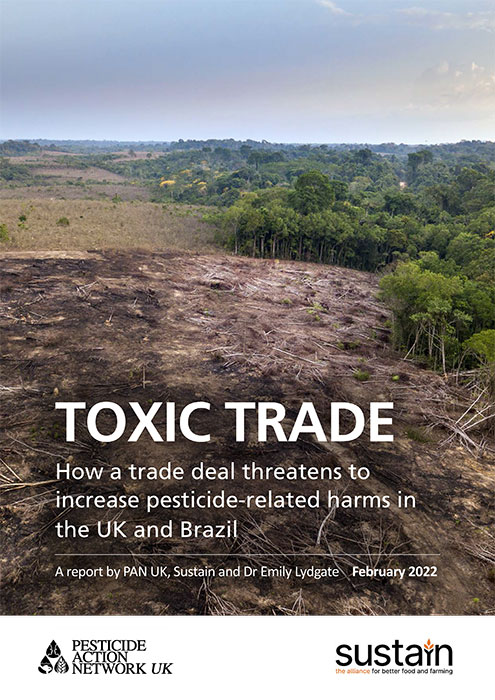
Toxic Trade: How a trade deal threatens to increase pesticide-related harms in the UK and Brazil
30pp - 2022 | 2860Kb

Toxic Trade: How a trade deal threatens to increase pesticide-related harms in the UK and Brazil
30pp - 2022 | 2860Kb
Toxic Trade Brazil – co-authored by PAN UK, Sustain and Dr Emily Lydgate – outlines how the growth in trade with Brazil being pursued by the UK Government could mean that British consumers unwittingly find their diets driving serious health and environmental impacts on the ground in Brazil where their food is grown. It is the third of a series of reports.
Brazil is the third largest user of pesticides globally and its so-called “Poison Package”, which is currently being pushed through Congress by President Bolsonaro, has slashed laws designed to protect human health and the environment from pesticides. The country’s pesticide standards are far weaker than those of the UK with almost double the number of highly hazardous pesticides allowed for use, including the lethal herbicide paraquat and bee-toxic neonicotinoids. The UK already imports significant amounts of food and animal feed (largely soya) from Brazil, both of which are likely to grow under a new trade agreement.
The report also exposes how an increase in trade with Brazil threatens to weaken the UK’s own domestic pesticide standards, with negative knock-on effects for both public health and the environment. As a major agricultural exporter, Brazil would have much to gain from a drop in UK standards, which currently exclude food exports containing pesticides in amounts that exceed UK safety limits. Brazil tends to allow larger amounts of highly hazardous pesticides to appear in food than the UK.
A rise in agricultural exports from Brazil also poses an economic threat to the future of UK farming. Judging by the UK-Australia Free Trade Agreement – the only new trade deal the UK has signed post-Brexit – it seems highly likely that an agreement would increase quotas under which Brazilian agricultural exports receive low tariffs, providing an incentive for Brazil to export more to the UK. This threatens to undercut UK farmers with a flood of cheap imports grown on a larger-scale and to lower environmental standards.
Key recommendations for the UK government:
The first 'Toxic Trade' report compared existing UK pesticide standards with those of the US, Australia and India and is available here.
The second report, released in June 2021, covers the UK accession to the Comprehensive and Progressive Trans Pacific Partnership and is available here.
The fourth report, released in October 2022, covers the proposed Free Trade Agreement between the UK and India and is available here.
Sustainable Farming Campaign: Sustain encourages integration of sustainable food and farming into local, regional and national government policies.
Sustain
The Green House
244-254 Cambridge Heath Road
London E2 9DA
020 3559 6777
sustain@sustainweb.org
Sustain advocates food and agriculture policies and practices that enhance the health and welfare of people and animals, improve the working and living environment, promote equity and enrich society and culture.
© Sustain 2024
Registered charity (no. 1018643)
Data privacy & cookies